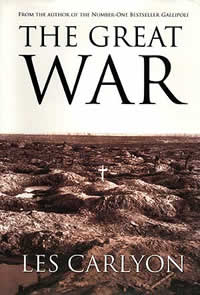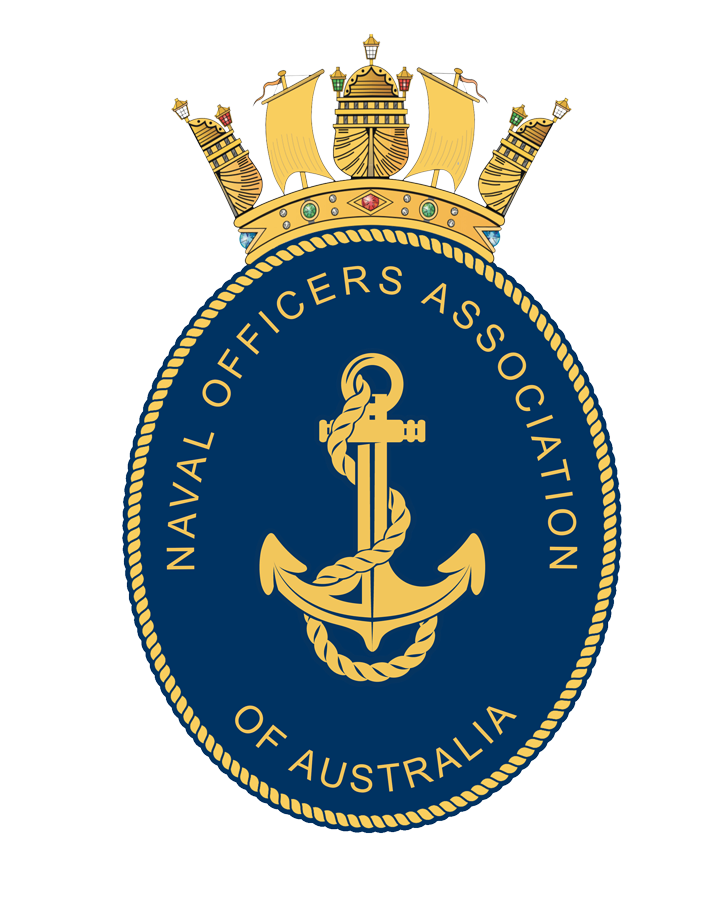The Great War
Book review by Kevin Rickard 
Carlyon, L. The Great War. Pan Macmillan Australia Pty. Ltd.: Sydney, 2006. 863 pp., $39.95 (ABC Shop).
This is a meticulously researched, elegantly told account of the battles, actions and ‘God forsaken fights’ in which the five Divisions of the AIF were involved in Belgium and France in World War I.
Les Carlyon had previously written Gallipoli. This book, The Great War, perhaps surpasses even Gallipoli in the expanse and magnitude of the battles detailed and analysed. It is in three parts, covering the activities of the AIF in the years 1916-1918. A number of poignant photographs add to the impact of this work.
To those of us who had family members in the first AIF in Belgium and France between 1916 and 1918, the book is a must read. Actions of relatives, Divisions, Brigades or Battalions can often be recognised in this saga with much sadness and grief but also with enormous pride.
The book details the tragic loss of life and casualties suffered by the AIF during the Somme offensive. We read especially of the Australian participation in such battles as those at Fromelles, Pozieres, Mouquete Farm, Bullecourt, Ypres, Menin Road, Villers Bretonneaux, Amiens, Mont St. Quentin and Passchendaele. We also read the portrayal and, what might now be considered, the ineptitude of many of the British commanders and generals that led to the tragic death of Australians, New Zealanders, British as well as Canadian and South African soldiers. The deaths and casualty figures speak for themselves. Some 61,700 Australians did not come home – two thirds of them lie along a line that stretches from Villers Bretonneaux to Passchendaele. The wounded ran to 150,000.
Victoria Crosses
Details are given of the remarkable heroism under fire of many Australian Victoria Cross winners, some of whom also won the Military Cross or the Military Medal. We become familiar with the Australian origins of these extraordinary warriors, their roots in Australia and their family circumstances. Such men as Albert Jacka, Fred Tubb, Harry Murray, Donovan Joynt and Joe Maxwell are but a few.
Through the book we read of the activities of generals with the AIF like Birdwood, Rosenthal and Gellibrand and how the Australian troops appeared to be responsive to LGEN Sir William Birdwood. There are stories about the legendary Pompey Elliott – the brigadier often seen in the front lines with his men but who unfortunately and to his everlasting disappointment, was not given a Division. Towards the end of the book we are told of the great skill and intellectual ability of Monash and the steadfastness of his newly formed Australian Corps and its commanders.
Douglas Haig
There is a continuous analysis throughout the book of Field Marshall Sir Douglas Haig who, although well qualified, was perceived as aloof and heartless. There are also references to the doubtful capacity of General Sir Hubert Gough, who was eventually replaced as the Field Commander. There is much fascination in the interaction between the politicians (the suits), like Asquith and Lloyd George and the senior generals — Field Marshall Haig and Field Marshall Lord Kitchener. Both of the latter are represented as remote from the Front Line.
In the midst of all of the above, there is an account of the Australian debate on Conscription, thought necessary by the Australian Government of the day to replace the rapidly diminishing Australian Divisions at the behest of the British Government. The Home front adversaries were Prime Minister Billy Hughes and the fearless advocate for the ‘No’ case in the referendum, Dr Daniel Mannix, the Catholic Archbishop of Melbourne at that time. The ‘No’ case won, the possibility of conscription was defeated. There is a detailed analysis of the results, which illustrate the surprising spread of the referendum votes.
In the end, the extraordinary Australian Corps under the leadership of General Sir John Monash fought the main adversary, the Germans, in the later battles of 1918. The Australian Corps broke through the Hindenburgh Line, which led to the eventual defeat of Germany.
The achievements of the Australians in World War I were truly extraordinary. It is impossible not to feel immensely proud of our men of the First AIF and of our heritage. We can also be most grateful to Les Carlyon for putting this amazing story before us in such a readable, personable and fascinating fashion.
